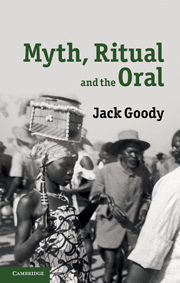Book contents
- Frontmatter
- Contents
- Acknowledgements
- Introduction
- 1 Religion and ritual from Tylor to Parsons: the definitional problem
- 2 Oral ‘literature’
- 3 The anthropologist and the audio recorder
- 4 Oral creativity
- 5 The folktale and cultural history
- 6 Animals, humans and gods in northern Ghana
- 7 The Bagre in all its variety
- 8 From oral to written: an anthropological breakthrough in storytelling
- 9 Writing and oral memory: the importance of the ‘lecto-oral’
- Appendix Folktales in northern Ghana
- References
- Index
8 - From oral to written: an anthropological breakthrough in storytelling
Published online by Cambridge University Press: 05 June 2012
- Frontmatter
- Contents
- Acknowledgements
- Introduction
- 1 Religion and ritual from Tylor to Parsons: the definitional problem
- 2 Oral ‘literature’
- 3 The anthropologist and the audio recorder
- 4 Oral creativity
- 5 The folktale and cultural history
- 6 Animals, humans and gods in northern Ghana
- 7 The Bagre in all its variety
- 8 From oral to written: an anthropological breakthrough in storytelling
- 9 Writing and oral memory: the importance of the ‘lecto-oral’
- Appendix Folktales in northern Ghana
- References
- Index
Summary
Oral forms of recitation are held to give primacy to the narrative. My own experience is that, as I have argued in Chapter 5, narrative folktales are mainly for children and that adults do not privilege the fictional narrative, which is often held to be untruth and hence subject to criticism, as in the Puritanical Complex. As we have seen, the emergence of ‘visible language’, of writing, made an important contribution to new forms of literature, such as the novel. But more than that it had a profound influence on society at large and specifically on the speed of social change in the accumulation of knowledge.
The telling of tales is often thought to be characteristic of all human discourse and it is fashionable to speak of narrative as a universal form of expression, one which is applicable both to the life experiences of individuals and to the dramas of social interaction. Storytelling in oral cultures is seen as the foundation on which the novel is built and the activity is regarded as the focus of much creativity in literate societies. Blind Homer was the model, putting all his oral imagination into the epic. In discussing storytelling we are clearly leading into the topics of fiction and the novel. But not all storytelling is fictional; it can also involve personal narratives, however, although typically the activity is associated with oral cultures, with ‘the singer (or teller) of tales’.
- Type
- Chapter
- Information
- Myth, Ritual and the Oral , pp. 117 - 152Publisher: Cambridge University PressPrint publication year: 2010
- 1
- Cited by



